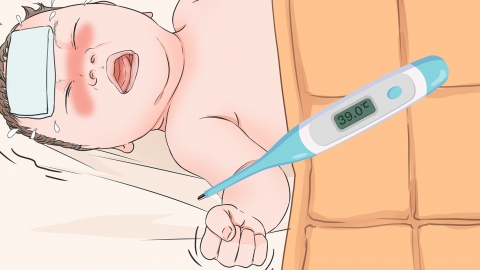What causes a baby to have a seizure at 39°C fever, and what should be done?
Generally speaking, fever refers to an elevated body temperature. If a baby develops a fever of 39°C accompanied by convulsions, it may be related to an underdeveloped thermoregulatory center, electrolyte imbalance, acute gastroenteritis, febrile seizures, or viral encephalitis. It is recommended to seek timely medical attention and follow the doctor's guidance regarding general care and medication. Detailed explanations are as follows:

1. Underdeveloped Thermoregulatory Center
A baby's thermoregulatory center is not yet fully developed, and its ability to regulate body temperature is relatively weak. When body temperature rises sharply, convulsions may easily occur. It is recommended to apply physical cooling methods promptly when a baby has a fever, such as tepid sponge baths or applying fever-reducing patches.
2. Electrolyte Imbalance
During fever, babies may experience electrolyte imbalance due to sweating and reduced food intake, such as low calcium or low magnesium levels, which can lead to convulsions. It is important to ensure adequate hydration and electrolyte replacement during fever, and to drink beverages containing electrolytes in moderation.
3. Acute Gastroenteritis
Acute gastroenteritis is usually caused by bacterial, viral, or parasitic infections. During acute gastroenteritis, the baby may develop symptoms such as high fever and diarrhea. Diarrhea can easily lead to dehydration, which in turn can cause convulsions. It is typically accompanied by symptoms such as vomiting, abdominal pain, and diarrhea. Treatment may involve medications such as Enteritis Ning tablets, compound berberine tablets, and smectite powder, as directed by a physician.
4. Febrile Seizures
Infectious diseases such as colds or pneumonia may cause elevated body temperature, leading to febrile seizures. When a child's body temperature rises rapidly, brain neurons may discharge abnormally, causing involuntary convulsions of the entire body or localized muscles. Symptoms may also include difficulty breathing and loss of consciousness. Treatment may involve medications such as mannitol injection, ribavirin granules, and ibuprofen granules, as directed by a physician.
5. Viral Encephalitis
Viral encephalitis is an inflammation of the brain parenchyma caused by viral infection. The virus infects brain tissue through the bloodstream, causing abnormal neuronal discharges, which can lead to convulsions. Symptoms may also include headache, dizziness, and impaired consciousness. Treatment may involve medications such as ceftriaxone sodium for injection, acyclovir for injection, and dexamethasone sodium phosphate injection, as directed by a physician.
During treatment and recovery, it is recommended to maintain a light diet, drink an appropriate amount of warm water, and avoid consuming greasy or spicy foods, which can help promote physical recovery.




